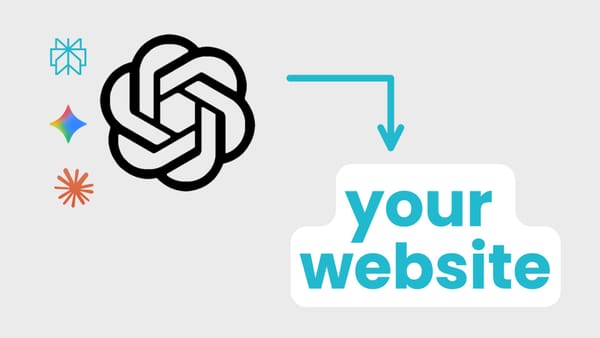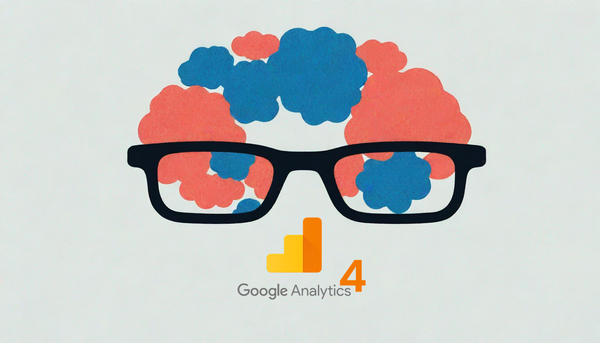Changes to Google's SEO Guidance in 2025
Stay on top of the changes and major hightlights announced at Google's Marketer conference, Marketing Live 2025. Get the tactical takeaways on how SEO and content marketing professionals should change their workflow to adjust to new AI changes.
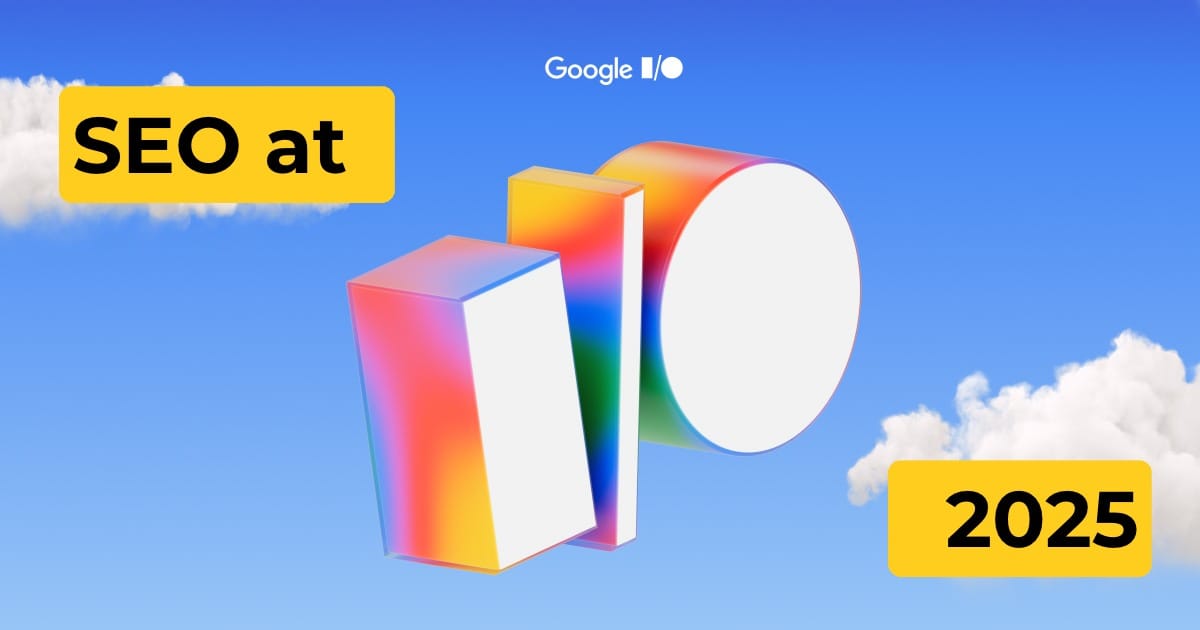
Google I/O 2025 has ushered in a paradigm shift for search, moving definitively beyond the traditional "ten blue links" to a more dynamic, AI-driven, and conversational experience. Last week, at Marketing Live 2025, Google released its new SEO guidance as it rolled out AI overviews to billions of users all over the world.
Google also shared updated SEO Guidance to ensure that content performs well in AI Overviews. In this article, I'll cover the major updates from the 2025 Marketing Live regarding SEO and how to increase your content's visibility in AI Mode and on AI chatbots.
Top SEO Changes from Google IO 2025
AI Mode and AI Overviews Reach More Users
Last year, in 2024, Google introduced AI Overviews, a generated segment at the top of the search results page for some queries on Google. Searches with AI Overviews show a 10% growth in queries, according to Philipp Schindler, the Chief Business Officer at Google. Schindler claimed that Google is the most popular generative AI product as a result.
"AI overviews is one of the most successful launches in search in the past decade. AI overviews are driving over 10% growth in the types of queries that show them relative to if [they] don't."
This year, Google announced that it's adding a new AI Mode, a dedicated AI experience without any of the traditional blue links in the traditional search surface. Previously only available to users who had opted into Google's AI Labs, AI Mode is rolling out gradually to all Google users, starting in the USA this month.
These features, powered by the new Gemini 2.5 model, aim to provide users with direct, synthesized answers to their queries, often eliminating the need to click through to individual websites. This change necessitates a strategic evolution for SEOs, focusing on becoming a trusted source for Google's AI.
Gemini has grown to 400 Million monthly-active users
In a press release published before Google I/O, CEO Sundar Pichai said that Google's Gemini AI app now has more than 400 million monthly active users. That number is up from March, when it estimated that Gemini had 350 monthly-active users (TechCrunch, March 2025).

This number is much smaller than the 1.5 Billion users who see AI Overviews in Google's Search Results. Since AI Overviews were insert4d at the top of Google's popular product, it's no surprise that it has much broader reach.

According to recent estimates, this number is about half of ChatGPT's weekly active user count. While the exact number of ChatGPT monthly-active users (MAU) is not known, OpenAI's COO Brad Lightcap said in February 2025 that it had reached 400 Million weekly-active users (Pymnts, Feb 2025). If the company is growing at the same rate it did in Q1 according to Google's own estimates, it would have reached 800 Million MAU by Q2. In April, CEO Sam Altman validated this 800 Million MAU estimate by saying "Something like 10% of the world uses our systems" (Pymnts, April 2025).
So, Google's Gemini chatbot has reached about half as many active users as ChatGPT as of May 2025.
AI Overviews show a more diverse set of sources
The keynote speaker shared that AI Overviews include a more diverse set of sources, offering the opportunity for discovery. This implies that SEO is not the same as Generative Search Optimization, and that AI Mode will shake up what sources get the most traffic from GoogleFor webmasters.
Overall search guidance has stayed the same
During Marketing Live, Google shared updated guidance for SEO. Overall, the guidelines have stayed consistent with its recommendations in previous years. In 2025, webmasters should:
- Focus on unique, valuable content for people
- Provide a great page experience
- Make sure structured data matches the visible content
- Go beyond text for multimodal success
Google also included guidance for webmasters who want to exclude their content from AI Mode and AI Overviews by making the page invisible to Google's web crawlers.
"Our core SEO philosophy still rings true: focus on building helpful, reliable, people-first content," Google writes at the top of it's official SEO guidance page.
Studies have shown that Generative Engine Optimization (GEO) performance is strongly correlated to SEO results. In other words, pages that get traffic on Google tend to show up in LLM results from ChatGPT, AI Overviews, and Perplexity. The generative search engines build on top of an existing search index where pagerank is still a key factor. Getting backlinks from high domain authority websites and mentions in original editorials and reviews drives up visibility both in generative and original search, especially since Perplexity and ChatGPT
Key Learnings for SEO Professionals in 2025
- Restructuring content: This requires creating content that is not only comprehensive and authoritative but also easily digestible and quotable. Think clear, concise answers to specific questions, well-structured articles with clear headings, and the use of lists and FAQs. One 2024 study by Wan, Wallace, and Klein from UC Berkeley found that adding a single sentence, generated by Claude, which restates the question and makes the stance of a text obvious can increase a product's visibility in Generative Search Engines like ChatGPT and AI Mode by almost 2% (Wan, Wallace, and Klein, 2024).
- Content Quality and E-E-A-T Reign Supreme: With AI synthesizing information, Google has put more emphasis on Experience, Expertise, Authoritativeness, and Trustworthiness (E-E-A-T). LLMs like Gemini will favor content from demonstrably credible sources. Investing in subject matter experts, building author authority, and ensuring factual accuracy are more important than ever.
- Prepare for "Zero-Click" Searches and Evolving Metrics: Notably, Google did not announce a new Search Console surface for AI Mode, and clicks from chatbots are difficult to attribute. As AI Overviews directly answer user queries, more search queries will be directly answered without a click to the source site. Marketing professionals may see an increase in impressions as their content is shown to more users, with the expansion of AI Mode and AI Overviews, and a lower click-through rate. Check out which pages on your website are gaining traction on ChatGTP through Google Analytics.
Is it true that AI clicks are higher quality?
During Marketing Live, Google justified its changes by reminding marketers (twice) that AI Overviews add value for business owners by making search better and referring higher quality traffic to their website. But Google's claim that these clicks are 'higher quality' warrants a closer look. To validate this claim, we looked at our own website data to see if AI chatbot traffic indeed did better than organic search traffic.
Time on page: Yes. In our website data, it appears that ChatGPT and Gemini referred traffic spends more time on page than Google-referred traffic, on average. aI looked into that question for our website, which is a SaaS product. It is true that users coming from gemini.google.com and from chatGPT.com spend on average 10 seconds more on our website, about 10% more than the average session.
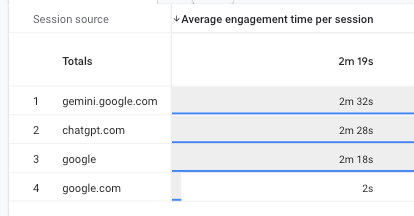
Likelihood to convert: Google also claims in the keynote that clicks coming from AI overviews are "higher quality," which I assume means more likely to convert. So, I looked in GA4 at the Session key event rate for referrals from ChatGPT vs from overall. On our website, traffic referred from ChatGPT and Gemini is not more likely to convert compared to traffic from organic Google Search.
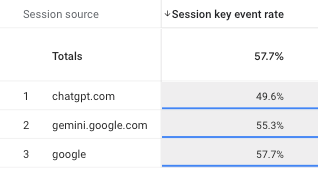
For us, our overall Google traffic is still more likely to convert than ChatGPT or Gemini traffic. To me, this makes sense because users who search for our brand name or a verb like "Video Translation" are very high intent users, whereas chatbots like ChatGPT are more exploratory. People also seem more likely to use Google for navigational queries, when they know what they'd like to buy and are returning to make a purchase.
We're skeptical that Google's AI overviews will actually send higher quality traffic to our website, but I agree with Google's claim that it is a better experience. I personally love using ChatGPT, and it makes sense that users conduct more searches when using the AI mode on Google because they may bring a whole new set of queries that Google didn't handle well before, like subjective questions, abstract ideas, and open-ended thoughts.
Now, as a long-time student of SEO, I've shifted my focus to learning about Generative Engine Optimization (GEO). Follow along on this blog and my YouTube channel to learn more about the latest experiments, papers, and thought leaders discovering how to get visibility in LLMs. Please connect with me on X or LinkedIn to share insights from your own experience with GEO.
Thanks for reading!

